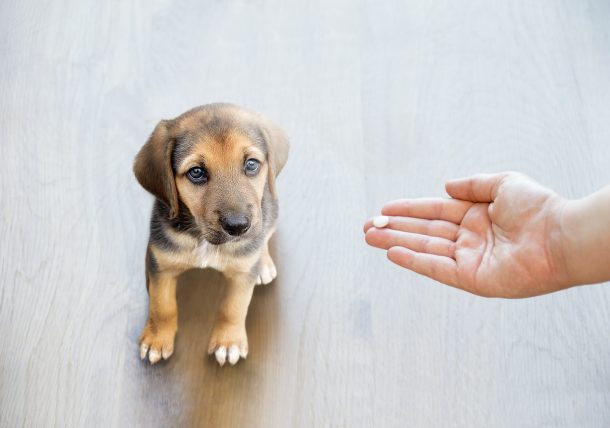Why Is My Vet Recommending Anti-Anxiety Medications for My Pet?
 Pet owner's hand reaching out to give his dog a pill / tablet.
Pet owner's hand reaching out to give his dog a pill / tablet.Many pet parents feel a sense of confusion when their veterinarian talks to them about anxiolyticsAnxiolytics, or anti-anxiety drugs, are a category of drugs used to prevent anxiety and treat anxiety related to several anxiety disorders.. If your pet has never growled, hissed or tried to bite anyone in front of you, it might seem excessive to discuss calming drugs for it. It’s also easy to take the recommendations personally, as if we were blaming you for your pet’s behavior. Nothing could be further from the truth! Like pediatricians, veterinarians know our patients can’t comprehend all of the scary things that happen to them during the course of a visit. We also know that fear of the veterinarian can escalate over time, especially if we don’t change our approach. The other unfortunate reality is that if your pet is fearful, it may not receive as thorough veterinary care because staff members may not be able to handle it easily or safely.
What are some signs of fear and stress in a pet?
In cats, we commonly see freezing, meowing, dilated pupils, flattened ears and hissing. In dogs, we often see panting, lip licking, freezing, pacing, yawning and barking. Both cats and dogs can have a crouched posture, flattened ears that face sideways or backwards, avoidance, growling, urinating, defecating, expressing anal glands and trying to bite.
Why should I give my pet medications for stress when they only go to the veterinarian once a year?
Imagine if once a year, someone put you into the car and drove you to a building full of giant people who held you down and jabbed you with needles with no explanation. How quickly would you develop a fear of this experience and feel anxiety when you knew what was coming? How long would it take you to recover from that terrifying “once a year” visit? The traditional approach to veterinary care is changing, and we realize now that it’s not enough to advocate solely for your pet’s physical health. In order to be truly compassionate, we also need to safeguard its emotional health.
In addition, if your pet were to become so fearful that it bit a staff member, animal control may be called, and your pet may have to undergo rabies quarantine. Not only would you be completely separated from your pet during this time but also you would be responsible for all costs incurred. Reducing fear in a pet with medications also helps decrease the chance of an injury occurring.
What kinds of medications are recommended, and when do they take effect and wear off?
There are a variety of oral anxiolytics commonly prescribed, including trazodone, gabapentin and alprazolam. These usually take effect between one to three hours after administration, and the effects last for four to six hours on the low end and eight to 12 hours on the high end.
How risky is it for my pet to take these medications?
In general, the risks are low for most pets. Always talk with your regular veterinarian about what types and dosages of medications are right for your pet, and give pets a test dose at least a week before your veterinary appointment so you can monitor for unwanted side effects. Sedation is common and desired, but some pets may develop GIgastrointestinal upset or even agitation.
I still don’t feel comfortable with giving my pet medications. Are there other things I can do to reduce fear and stress in my pet?
Yes! Cat parents can do positive carrier training and cover the carrier with a towel to allow their cat to hide. Dog parents can make sure their pet is comfortable with car rides. Bring your own pea-sized, delicious treats to the clinic, and bring your pet hungry, unless your veterinarian recommends otherwise, so it will be more food-motivated and receptive to positive reinforcement. Plan ahead and schedule your pet’s visit for a time when you can arrive early, instead of dashing home after work to grab your pet. When you’re running late, you’re more likely to make hurried movements and give off your own anxiety, which will stress your pet even more. There are also pheromonesSubstances which are secreted to the outside by an individual and received by a second individual of the same species. and supplements that may help reduce stress.
For more information about how to advocate for your pet’s emotional health, visit www.fearfreehappyhomes.com and www.catfriendly.com.
Dr. Julie Liu earned her Doctorate of Veterinary Medicine from the University of Minnesota College of Veterinary Medicine in 2009, her Certification of Veterinary Acupuncture from the Chi Institute in 2018 and is a Fear Free Elite Certified Professional. She is also a AAFP Cat Friendly Veterinarian and is Low Stress Handling® Silver Certified. With 12 years of professional experience, she is an independent contractor licensed to practice in Texas and California. Learn more about Dr. Liu by visiting her website: www.drjulieliu.com.

